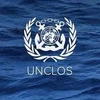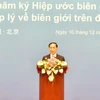Vietnamese Prime Minister Nguyen Tan Dung and his New Zealand counterpart John Key have agreed to intensify the two countries’ comprehensive partnership, ultimately building towards a future strategic partnership.
During their talks in Auckland on March 19, New Zealand PM John Key hailed the Vietnamese leader’s official visit as an important event amid activities to mark the 40th founding anniversary of their diplomatic ties (1975-2015).
The two leaders voiced their delight at the substantial development of bilateral cooperation in politics, trade, investment, security-defence, education and culture.
Trade reached 800 million USD in 2014, rocketing up 120 percent within the five years since their comprehensive partnership was set up in 2009. It is hoped to hit 1.7 billion USD by 2020.
At the talks, both sides pledged to create the best possible conditions for goods and services to enter each other’s market.
New Zealand promised to consider the import of Vietnamese fruits such as rambutan, longan, star apple, and grapefruit. It also regards Vietnam as a potential market and will continue investing in realms of shared interest such as agriculture, energy, and education-training.
The two PMs said their countries will enhance all-level delegation exchanges and diversify forms of contact, expanding to include phone conversations, meetings on the fringe of high-level conferences, and special envoys. They will also more effectively utilise current cooperation mechanisms to successfully implement signed agreements and targets stipulated in the second phase of their action programme (2013-2016).
The leaders discussed measures to boost cooperation in defence-security, education, people-to-people exchange, and labour.
PM Nguyen Tan Dung valued the New Zealand Government’s official development assistance to Vietnam and sought closer collaboration in common concerns, including agriculture and rural areas, human resources development, disaster risk management, and post-war recovery.
Meanwhile, PM John Key affirmed that New Zealand will continue to provide technical support to improve Vietnam’s human resource capacity. He also suggested a new cooperation model called inter-governmental trade partnership.
The two sides consented to increase cultural, artistic and tourism exchange activities to enhance mutual understanding, especially as they celebrate 40 years of diplomatic relations in 2015. In that spirit, a direct air route between the nations is expected to be established shortly to foster trade, tourism, and people-to-people exchanges.
Vietnam currently ranks ninth among countries sending students to New Zealand.
PM John Key appreciated the contributions of the Vietnamese community to his country and pledged to provide favourable conditions for them to settle, integrate, and engage in local political and socio-economic activities.
During the talks, both sides were unanimous in expanding consultation, policy coordination, and mutual support to address global challenges and promote shared matters. They also committed to shortly conclude negotiations on free trade deals such as the Trans-Pacific Partnership agreement and the Regional Comprehensive Economic Partnership agreement.
PM John Key thanked Vietnam for supporting New Zealand’s candidacy for a non-permanent member of the United Nations Security Council’s 2015-2016 term and committed to support the Southeast Asian country’s organisation of the 2017 Asia-Pacific Economic Cooperation (APEC) forum.
Sharing views on regional and international issues of common concern, the two leaders underscored the importance of maintaining regional peace and stability and called on concerned parties to resolve sea disputes without force and in line with international law, including the 1982 United Nations Convention on the Law of the Sea.
On the occasion, PM Nguyen Tan Dung invited the New Zealand Prime Minister to visit Vietnam. John Key accepted and confirmed his visit will take place within the year.
Following their talks, the two sides issued a joint statement on strengthening the Vietnam-New Zealand comprehensive partnership.
The PMs also witnessed the signing of an agreement on food safety and animal and plant quarantine as well as a protocol amending their air services agreement.-VNA
During their talks in Auckland on March 19, New Zealand PM John Key hailed the Vietnamese leader’s official visit as an important event amid activities to mark the 40th founding anniversary of their diplomatic ties (1975-2015).
The two leaders voiced their delight at the substantial development of bilateral cooperation in politics, trade, investment, security-defence, education and culture.
Trade reached 800 million USD in 2014, rocketing up 120 percent within the five years since their comprehensive partnership was set up in 2009. It is hoped to hit 1.7 billion USD by 2020.
At the talks, both sides pledged to create the best possible conditions for goods and services to enter each other’s market.
New Zealand promised to consider the import of Vietnamese fruits such as rambutan, longan, star apple, and grapefruit. It also regards Vietnam as a potential market and will continue investing in realms of shared interest such as agriculture, energy, and education-training.
The two PMs said their countries will enhance all-level delegation exchanges and diversify forms of contact, expanding to include phone conversations, meetings on the fringe of high-level conferences, and special envoys. They will also more effectively utilise current cooperation mechanisms to successfully implement signed agreements and targets stipulated in the second phase of their action programme (2013-2016).
The leaders discussed measures to boost cooperation in defence-security, education, people-to-people exchange, and labour.
PM Nguyen Tan Dung valued the New Zealand Government’s official development assistance to Vietnam and sought closer collaboration in common concerns, including agriculture and rural areas, human resources development, disaster risk management, and post-war recovery.
Meanwhile, PM John Key affirmed that New Zealand will continue to provide technical support to improve Vietnam’s human resource capacity. He also suggested a new cooperation model called inter-governmental trade partnership.
The two sides consented to increase cultural, artistic and tourism exchange activities to enhance mutual understanding, especially as they celebrate 40 years of diplomatic relations in 2015. In that spirit, a direct air route between the nations is expected to be established shortly to foster trade, tourism, and people-to-people exchanges.
Vietnam currently ranks ninth among countries sending students to New Zealand.
PM John Key appreciated the contributions of the Vietnamese community to his country and pledged to provide favourable conditions for them to settle, integrate, and engage in local political and socio-economic activities.
During the talks, both sides were unanimous in expanding consultation, policy coordination, and mutual support to address global challenges and promote shared matters. They also committed to shortly conclude negotiations on free trade deals such as the Trans-Pacific Partnership agreement and the Regional Comprehensive Economic Partnership agreement.
PM John Key thanked Vietnam for supporting New Zealand’s candidacy for a non-permanent member of the United Nations Security Council’s 2015-2016 term and committed to support the Southeast Asian country’s organisation of the 2017 Asia-Pacific Economic Cooperation (APEC) forum.
Sharing views on regional and international issues of common concern, the two leaders underscored the importance of maintaining regional peace and stability and called on concerned parties to resolve sea disputes without force and in line with international law, including the 1982 United Nations Convention on the Law of the Sea.
On the occasion, PM Nguyen Tan Dung invited the New Zealand Prime Minister to visit Vietnam. John Key accepted and confirmed his visit will take place within the year.
Following their talks, the two sides issued a joint statement on strengthening the Vietnam-New Zealand comprehensive partnership.
The PMs also witnessed the signing of an agreement on food safety and animal and plant quarantine as well as a protocol amending their air services agreement.-VNA



















